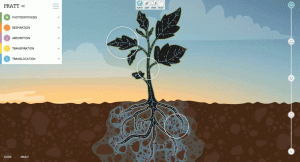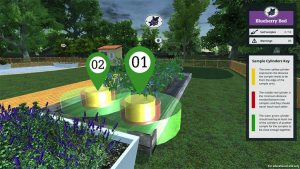Lee Ivy and DELTA Team win 2017 Gertrude Cox Award

DELTA's Cathi Dunnagan pictured with Lee Ivy, 2017 Gertrude Cox Award Recipient. Photo: Becky Kirkland
DELTA congratulates Lee Ivy as a recipient of the 2017 Gertrude Cox Award for Innovative Excellence in Teaching and Learning with Technology. Nominated for his exemplary course, HS200, Home Horticulture, Ivy accepted the award on Monday, April 3.
To revise and improve the course for student success, Ivy applied for and received two DELTA Grants, Distance Education Course Grant and Exploratory Grant.
During the Distance Education Course Grant, Ivy and the DELTA team took the existing course inherited from a previous instructor, deconstructed it, and created a course that is truly a reflection of Ivy’s approach to home horticulture. With Cathi Dunnagan, lead instructional designer, leading the analysis, Ivy restructured the course based on learning outcomes and the concept of building a landscape plan from basics to final plan with experiential learning throughout the semester. The resulting course builds student knowledge from foundational knowledge, such as “Speaking the Language,” plant growth and anatomy, and the basics of propagation, soils, selection, pruning, through standards, such as turfgrass, interiors, fruits and vegetables, into specialty gardens, sustainable practices, with landscape design and inspiration. Throughout the semester, students plan and develop their very own complete landscape design for the real-world site they select during the first weeks.
The purpose of the Exploratory Grant was to address concepts that students continued to have
difficulty grasping, even with the newly redesigned course. Ivy identified two concepts as highest priority, 1) the interactivity of the five plant process and 2) soil collection and soil analysis.
In order to help students better understand plant processes, Ivy and the DELTA team created a PRATT learning object. PRATT stands for photosynthesis, respiration, absorption, translocation and transpiration.

This tool explains the five different processes that a plant undergoes throughout a 24-hour period and how these processes interact. Clicking hotspots on the plant’s leaves, stem, and roots give students a closer look inside each part of the plant and the processes that occur in those locations. Creative animations demonstrate the various states of each process.
To provide students practice opportunities prior to completing the hands-on assignment, the team developed a 3D environment for soil sampling and soil analysis.
Students use this virtual environment to practice gathering soil samples, reading soil reports and calculating soil amendments before performing the tasks on their own. Information provided in student evaluations shows course participants are finding this virtual component beneficial to their learning. See additional information from our annual report.
“As a former Agricultural Education major, I understand the importance of creating a lesson that appeals to different learning styles. What Professor Lee Ivy has created, does just that,” said Agriculture Science student Chasity Smith in a letter supporting Ivy’s nomination.
The Gertrude Cox Award for Innovative Excellence in Teaching and Learning with Technology began in 2002 “to honor the creative pedagogy of NC State’s faculty and technical staff and their work in integrating new technologies into effective teaching strategies.” Nominees should be current faculty or staff members at NC State and work submitted should have been developed or refined within the previous academic year. Former nominees who did not win may reapply if new work has been contributed to their projects. A peer-reviewed faculty process determines the winners of the three types of awards: Innovative Tool, Exemplary Course and Other.
It has been a great privilege to work with the talented, dedicated and creative people at DELTA. They challenged me with new technologies, new ways of thinking about course content and new ways to deliver information and inspire students to learn. I am a better educator because of this experience.
Again, we would like to congratulate Ivy and his DELTA partners on such a distinct honor. Congrats!
DELTA Grants HS 200 Project Team Members
- Lee Ivy, Principal Investigator, Faculty (HS 200 DE Grant, Exploratory Grant)
- Elizabeth Riley, Teaching Assistant (HS 200 DE Grant)
- Cathi Phillips Dunnagan, Lead Instructional Designer, Project Lead (HS 200 DE Grant, Exploratory Grant)
- Laurie Gyalog, Project Coordinator, Project Lead (HS 200 DE Grant, Exploratory Grant)
- Amanda Robertson, Media Lead, Project Lead (HS 200 DE Grant, Exploratory Grant)
- Chrissie Van Hoever, Media Lead (HS 200 Exploratory Grant – PRATT, 3D Soil Analysis and Soil Sampling)
- Benjamin Huckaby, Media Lead (HS 200 Exploratory Grant – 3D Soil Analysis and Soil Sampling)
- David Tredwell, Media Specialist (HS 200 Exploratory Grant – PRATT)
- Megan Snyder, Illustrator, Animator (HS 200 Exploratory Grant – PRATT)
- Stephen Minervino, Illustrator (HS 200 DE Grant)
- Kelly Fish, Illustrator (HS 200 DE Grant)
- Thomas Crocker, Videographer (HS 200 DE Grant)
This post was originally published in DELTA News.
- Categories:



